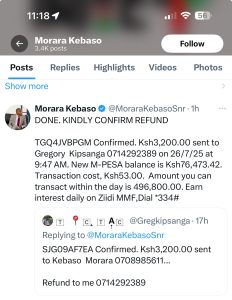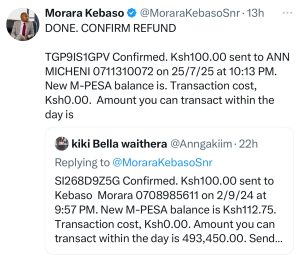Morara Kebaso, a civic educator and politician, recently disclosed during an interview on Andrew Kibe’s platform that he returned a mansion donated to him by a Kikuyu couple who supported his political endeavors after stepping back from active politics.
In light of concerns about being perceived as a conman and the emotional distress caused by public accusations, Kebaso has initiated a three-day refund process for citizens who contributed to his political activities. He expressed his distress on social media, inviting anyone who feels deceived by their contributions to request a full refund by providing their M-Pesa transaction details.
The leader of the INJECT party emphasized that his reputation is more important than any financial gain, offering a 72-hour window for contributors to submit their transaction information for verification.
Kebaso’s political journey gained momentum in 2024 during youth-led protests, where his critical exposés of government projects garnered significant public support, including a generous donation of a luxurious house in Kahawa Sukari to serve as his operational base. However, the narrative took a turn as he decided to return the mansion after his departure from active politics.
The decision to offer refunds stems from what Kebaso describes as daily trauma from accusations of financial impropriety.
His statement reveals the psychological burden of public scrutiny, particularly from those who question his handling of donated funds.
“If you need a refund for any contribution you made to me when I was raising funds, kindly reply below with the Mpesa message,” Kebaso wrote, addressing contributors who may have interpreted his efforts as politically motivated rather than civic education.
The refund initiative appears to be both a defensive move and an attempt to clear his name definitively.
“I cannot continue to dirty my reputation and earn the tag of a conman or beggar. It’s not worth it,” he stated, indicating his willingness to sacrifice financial resources to protect his public image.
Already processing returns
Kebaso has already begun processing refunds, with reports showing he has returned money to individual contributors.
Recent evidence shows he returned KSh 500 to a woman who had donated toward his campaign and political work, demonstrating his commitment to the refund promise.
The process involves careful verification of transactions to ensure legitimacy.
Contributors are required to submit either their original M-Pesa messages or reference codes obtained from their mobile money statements.
Kebaso’s team has indicated they will verify each transaction before processing refunds.
This refund initiative comes at a time when Kebaso has stepped back from active politics, having announced his exit from the political arena earlier this year.
The move raises questions about the sustainability of grassroots political movements that rely heavily on public contributions.
The refund is primarily intended for individuals who feel their support was misunderstood as political endorsement, suggesting Kebaso seeks to distinguish between civic education and political campaigning in the public mind.
His decision to prioritize reputation over financial resources reflects the complex relationship between public figures and their supporters in Kenya’s digital age, where social media can quickly transform heroes into villains.
Kebaso’s situation highlights the challenges facing grassroots political movements in Kenya. The ease with which public contributions can be mobilized through mobile money platforms has democratized political fundraising, but it has also created new vulnerabilities for recipients.
The civic educator’s experience demonstrates how quickly public sentiment can shift, particularly when financial transparency becomes a contentious issue. His proactive approach to addressing these concerns through voluntary refunds represents an unusual response in Kenyan politics, where such accountability measures are rarely seen.
As the three-day refund window progresses, Kebaso’s initiative will likely serve as a precedent for how political figures handle public contributions amid controversy.
Whether this move will restore his reputation or mark the end of his political influence remains to be seen.
The story of Morara Kebaso serves as a cautionary tale about the double-edged nature of public support in Kenya’s evolving political landscape, where social media fame and crowdfunded activism can quickly transform from assets into liabilities.





